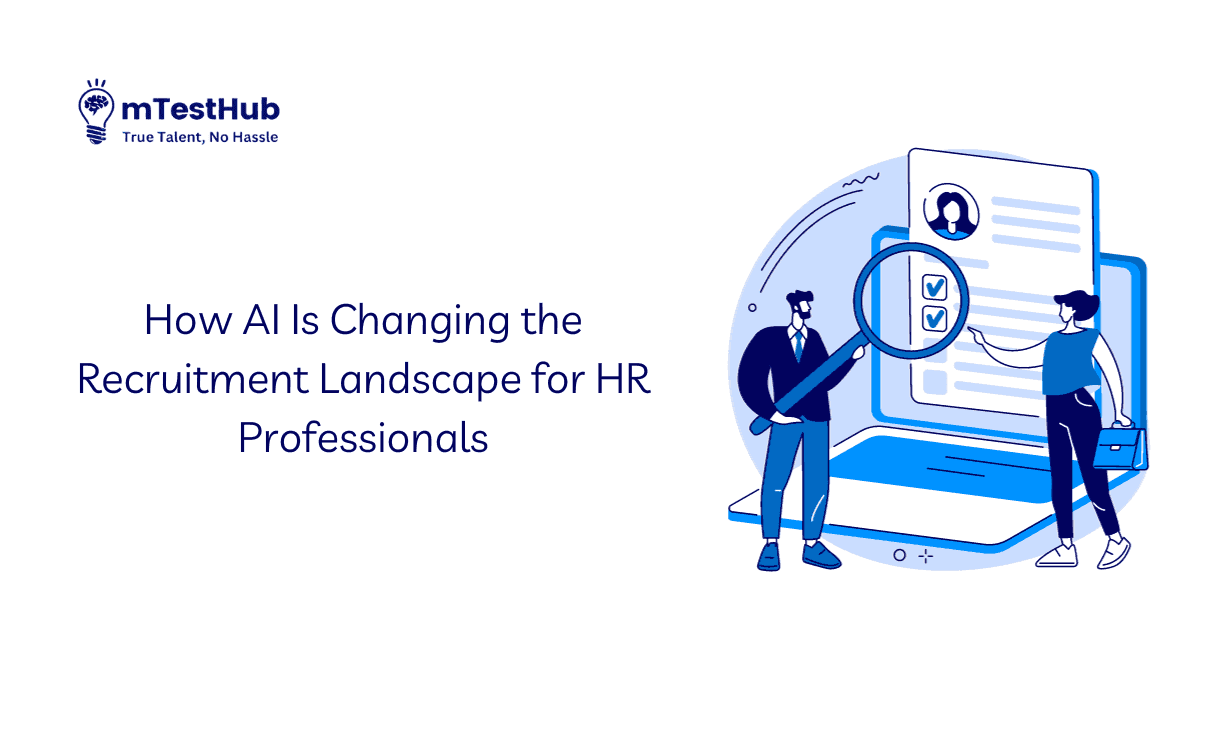Explore how AI revolutionizes recruitment with efficient, fair, and strategic tools for HR. Delve into our blog for insights on AI's transformative role in HR.


Product Marketer. MTestHub
The recruitment industry is undergoing a transformative phase with the advent of Artificial Intelligence (AI). HR professionals are increasingly turning to AI to streamline the hiring process, improve candidate experiences, and make better hiring decisions. A recent LinkedIn report suggests that 76% of hiring managers believe AI's impact on recruiting will be significant.

AI-driven systems are now capable of screening thousands of resumes quickly, identifying the most suitable candidates based on predetermined criteria. This automation reduces the manual workload of HR teams and accelerates the hiring process.
AI algorithms are adept at matching job requirements with candidate profiles by analyzing a myriad of factors, far beyond the capabilities of manual processing. This precision in matching ensures that companies attract the most qualified candidates.
One of the groundbreaking contributions of AI in recruitment is the reduction of unconscious biases. AI systems can be programmed to ignore demographic information about candidates, such as gender, race, and age, making the recruitment process more equitable.
AI-powered chatbots can handle initial candidate queries and engage with applicants, providing a responsive and interactive experience.
AI's predictive analytics can forecast the future performance of candidates, helping HR professionals make data-driven decisions.
Advanced AI tools can analyze video interviews, assessing candidates' non-verbal cues and communication skills, which are crucial in understanding a candidate's suitability for a role.
As with any technology, the ethical use of AI in recruitment is paramount. Companies must ensure AI tools are used responsibly and transparently.
With AI processing large volumes of personal data, adhering to data privacy laws and regulations is critical.
AI enables personalized communication with candidates at various stages of the hiring process. This can range from tailored job recommendations to personalized feedback, enhancing the candidate experience significantly.
AI tools can analyze candidate engagement, providing insights into their behavior and preferences. This information can be used to optimize recruitment strategies and improve candidate retention rates.
AI can automate parts of the onboarding process, making it smoother for new hires. This includes the provision of customized learning paths based on the employee's role and skill set.
AI-driven platforms can facilitate continuous learning and development for employees, aiding in career progression and skill enhancement.
In the era of remote work, AI plays a crucial role in facilitating remote recruitment processes. It enables HR professionals to efficiently conduct virtual interviews and assessments.
AI-powered recruitment tools allow HR professionals to tap into a global talent pool, overcoming geographical barriers and enabling the hiring of the best talent worldwide.
The future of AI in recruitment looks promising, with evolving capabilities such as advanced natural language processing and deeper learning algorithms.
Ongoing focus on developing ethical AI solutions that respect candidate privacy and promote diversity will be pivotal.
AI's role in transforming the recruitment landscape is undeniable. From automating tedious tasks to personalizing the candidate experience and enabling effective remote hiring, AI is providing HR professionals with powerful tools to revolutionize their recruitment strategies. As we look to the future, the ethical and responsible use of AI will continue to shape and define the success of HR practices in the digital age.
Be the first to know the latest hiring trends, product updates, and exclusive tips to streamline your recruitment process by joining our newsletter.

Streamlining Recruitment, Assessments, and Exams with AI-driven automation.
We use cookies to improve your experience. By continuing, you consent to their use. Do you accept?